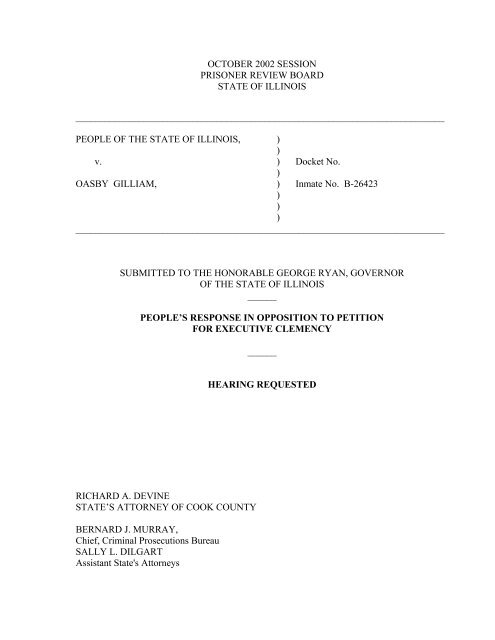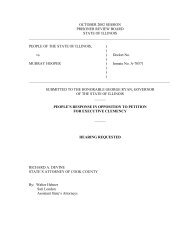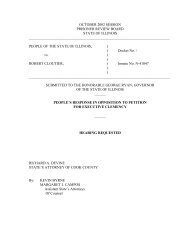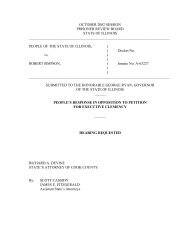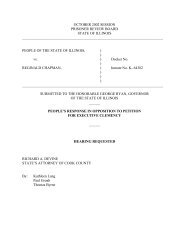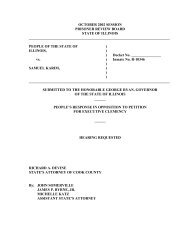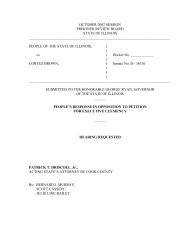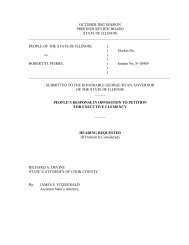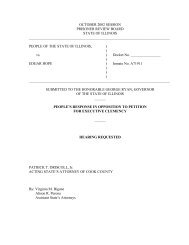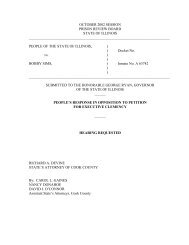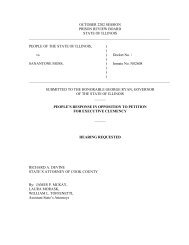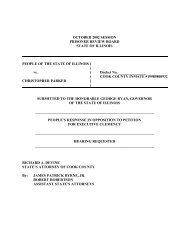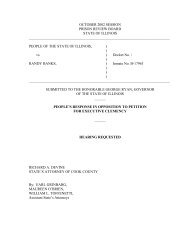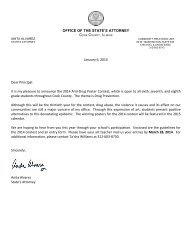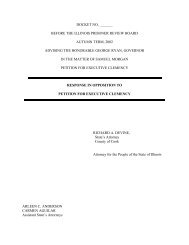Oasby Gilliam - Cook County State's Attorney
Oasby Gilliam - Cook County State's Attorney
Oasby Gilliam - Cook County State's Attorney
Create successful ePaper yourself
Turn your PDF publications into a flip-book with our unique Google optimized e-Paper software.
OCTOBER 2002 SESSION<br />
PRISONER REVIEW BOARD<br />
STATE OF ILLINOIS<br />
____________________________________________________________________________<br />
PEOPLE OF THE STATE OF ILLINOIS, )<br />
v.<br />
)<br />
) Docket No.<br />
OASBY GILLIAM,<br />
)<br />
) Inmate No. B-26423<br />
)<br />
)<br />
)<br />
____________________________________________________________________________<br />
SUBMITTED TO THE HONORABLE GEORGE RYAN, GOVERNOR<br />
OF THE STATE OF ILLINOIS<br />
______<br />
PEOPLE’S RESPONSE IN OPPOSITION TO PETITION<br />
FOR EXECUTIVE CLEMENCY<br />
______<br />
HEARING REQUESTED<br />
RICHARD A. DEVINE<br />
STATE’S ATTORNEY OF COOK COUNTY<br />
BERNARD J. MURRAY,<br />
Chief, Criminal Prosecutions Bureau<br />
SALLY L. DILGART<br />
Assistant <strong>State's</strong> <strong>Attorney</strong>s
OCTOBER 2002 SESSION<br />
PRISONER REVIEW BOARD<br />
STATE OF ILLINOIS<br />
____________________________________________________________________________<br />
PEOPLE OF THE STATE OF ILLINOIS,<br />
v.<br />
OASBY GILLIAM,<br />
)<br />
) Docket No.<br />
)<br />
) Inmate No. B-26423<br />
)<br />
)<br />
)<br />
____________________________________________________________________________<br />
I.<br />
HISTORY OF THE CASE<br />
<strong>Oasby</strong> <strong>Gilliam</strong> ["Petitioner"] stands convicted of the June 19, 1992 murder, aggravated<br />
kidnapping and robbery of a 79 year old Chicago woman named Aileen D'Elia. After trying to<br />
rob a man at a nearby bar, as a result of which he needed a getaway car, Petitioner kidnapped<br />
Mrs. D'Elia, forced her into the trunk of her car, and drove her to a soybean field in Mt.<br />
Vernon, Illinois where he strangled and repeatedly beat her with a tire iron until she finally<br />
died. He also stole her car and watch. The jury found Petitioner guilty of first-degree murder,<br />
aggravated kidnapping, and two counts of robbery.<br />
Petitioner retained his jury for the sentencing hearing, and the jury concluded that the<br />
death penalty was the right punishment for these crimes. The judge then sentenced Petitioner<br />
to death for the murder of Aileen D'Elia. After finding the offenses were committed in an<br />
exceptionally brutal or heinous manner against a senior citizen, the judge also ordered<br />
Petitioner to serve concurrent, extended term sentences of 30 years each for the three remaining<br />
felonies.<br />
1
The Illinois Supreme Court affirmed Petitioner's convictions and sentences on direct<br />
appeal. A copy of the decision in People v. <strong>Gilliam</strong>, 171 Ill. 2d 484, 670 N.E.2d 606 (1996)<br />
has been appended to this Response as Exhibit A. The United States Supreme Court did not<br />
find any reason to review the case. Petitioner then returned to the circuit court where he filed a<br />
post-conviction petition which the judge denied on April 27, 2000. Petitioner has appealed that<br />
decision to the Illinois Supreme Court, where his appeal is currently pending.<br />
2
II.<br />
FACTS OF THE CASE<br />
The <strong>State's</strong> Case In Chief<br />
Petitioner Tries To Rob Russell Turner And Beats Him<br />
With A Bag Of Bricks<br />
On June 19, 1992, bartender Russell Turner was alone at work at Sovereign Liquors, a<br />
bar located at 6202 N. Broadway in Chicago, Illinois. As Turner leaned over the bar to fill a<br />
glass with ice, Petitioner struck Turner on the head with a bag containing two bricks, and a<br />
vicious and bloody struggle ensued. Petitioner repeatedly struck Turner with the bricks and<br />
with a liquor bottle, as well. In fact, Turner said that Petitioner continued to hit and beat him<br />
on the head even after he was down on the floor, defenseless. Turner later received 48 stitches<br />
to close his wounds; he had been hit on the head at least 20 times.<br />
Because Turner was covered in his own blood, Petitioner managed to slip out of<br />
Turner's hands and escape. Petitioner ran toward Lakewood Avenue, the street on which Mrs.<br />
D'Elia lived. The crimes at Sovereign Liquors took place at approximately 2:15 p.m., and the<br />
attack on Turner lasted approximately 10 to 15 minutes.<br />
Notwithstanding Petitioner's current protests to the contrary, there was never any<br />
genuine doubt about Petitioner's guilt; police officers later found Petitioner's wallet (which<br />
contained his identification and photograph) at the bar. Moreover, Turner identified Petitioner<br />
from a photograph array, at a lineup, and again in open court. Petitioner was charged with the<br />
3
attempted robbery of Turner, and the charge was dismissed only because the State elected to<br />
proceed on the first degree murder charge in this case.<br />
Petitioner Kidnaps Mrs. D'Elia And<br />
Forces Her Into The Trunk Of Her Car<br />
The victim in this case, Aileen D'Elia, lived at 6223 N. Lakewood Avenue in Chicago.<br />
Mrs. D'Elia was 79 years old, 5 feet 2 inches tall, and owned a brown Chevrolet Caprice. The<br />
car was in good condition because Mrs. D'Elia kept it in the garage behind her home. Mrs.<br />
D'Elia routinely wore a Medic Alert bracelet, a ring containing an aquamarine stone, and a<br />
watch.<br />
Fifteen (15) minutes or so after Petitioner tried to rob Sovereign Liquors, Mrs. D'Elia<br />
returned home and drove her car next to her garage. She had been out to get her hair done.<br />
This was the first time she had been out since undergoing cataract surgery 9 days before, and<br />
this was the first day that she had not needed assistance from her daughter to put medicinal<br />
drops in her eyes. At approximately 4:30 p.m., the victim's granddaughter noticed that the<br />
victim's apartment door was ajar and that her car was missing.<br />
A Hunter Finds Mrs. D'Elia's Body In A Bean Field<br />
On July 1, 1992 a hunter found Mrs. D'Elia's badly decomposed body in a soybean field<br />
in Jefferson <strong>County</strong>, approximately 2 ½ miles from Interstate 57. The body was in a wooded<br />
area not visible from a nearby access road. Crime technicians found the victim's Medic Alert<br />
bracelet, dentures, and a watch crystal near the body. The technicians also found two plastic<br />
grocery bags from the grocery store where the victim regularly shopped. One of the bags had a<br />
red substance with gray hairs consistent with those of the victim. The hairs were broken off at<br />
the roots, consistent with having been struck by a blunt object. The pockets of Mrs. D'Elia's<br />
4
slacks had been turned inside out, and police officers found only 38 cents in her clothing. The<br />
victim's identification and driver's license were subsequently found in a bushy area next to an<br />
exit ramp of Interstate 57.<br />
Mrs. D'Elia died from multiple skull fractures caused by multiple blows to the head and<br />
face. All of the fractures were consistent with being struck by a tire iron. Injuries to Mrs.<br />
D'Elia's voice box also suggested strangulation as a contributory cause of death. The forensic<br />
pathologist testified that she may have lived for several hours after the attack.<br />
Petitioner Flees The State To Avoid Arrest<br />
On the afternoon of June 20, Petitioner arrived in Greenwood, Mississippi, to visit an<br />
aunt named Theresa Caruthers and a cousin named Thelma Scott-Robinson. Petitioner said<br />
he'd come to pay a social call, even though he had not seen them for 4 or 5 years. Petitioner<br />
was tired and said he had driven all night. Petitioner drove a brown, four-door Chevrolet in<br />
good condition with Illinois license plates, and he claimed to own the car. His relatives did not<br />
believe him. When Robinson asked Petitioner about stains in the back seat of the car that<br />
appeared to her to be blood, Petitioner replied that children had spilled juice on the seat.<br />
Robinson also noticed "a costume jewelry old-time Indian like ring" (by inference, the<br />
aquamarine ring) on the front seat of the car. Petitioner said that he had bought it. Robinson<br />
thought Petitioner appeared to be nervous and restless. She asked him what was wrong and<br />
Petitioner replied, "If you only knew."<br />
A Chicago police detective assigned to investigate the Sovereign Liquors incident<br />
looked inside Petitioner's wallet and found a slip for a pawn shop where Petitioner's girlfriend,<br />
Daphne "Trina" Townsend, worked. The pawnshop was 1½ blocks away from both Sovereign<br />
5
Liquors and Mrs. D'Elia's home. Townsend told the officer she had last seen Petitioner on the<br />
morning of June 19.<br />
The officer also interviewed one of Petitioner's sisters and Petitioner's employer. The<br />
police then applied to the FBI for a federal warrant for Petitioner's arrest. The police also<br />
contacted Caruthers and maintained contact with Townsend and another of Petitioner's sisters,<br />
Edna Bridges.<br />
Petitioner Confesses To Police Officers<br />
Petitioner returned to Chicago during the week of August 11, 1992 and stayed with<br />
Bridges. Seven (7) days later, Petitioner directed Bridges and Townsend to telephone police<br />
officers and arrange for his surrender. Police officers went to Bridges' apartment building<br />
where they arrested Petitioner. At the family's request, they took him down the back stairs and<br />
did not handcuff him until after they had reached the squad car, where an officer gave him his<br />
Miranda warnings. Petitioner said he understood his rights. Petitioner was then taken to police<br />
headquarters where he was given his Miranda rights several more times.<br />
Petitioner's Oral Confession To The Officers<br />
Townsend told the officers that Petitioner had arrived the previous Tuesday, whereas<br />
Petitioner claimed he had arrived in Chicago that very day. Townsend gave the officers a note<br />
to pass along to Petitioner which said "Gil, I told them that you came back last Tuesday".<br />
Petitioner confessed a short time later.<br />
In his oral confession to the police officers, Petitioner said he had seen Turner enter<br />
Sovereign Liquors. Petitioner implausibly claimed he had recognized Turner as the man who<br />
had punched his pregnant girlfriend in the stomach the preceding week. Petitioner said he<br />
entered the tavern with a brick and a fight ensued.<br />
6
Continuing his statement, Petitioner claimed he had seen a black man standing in the<br />
doorway as he ran out of the bar. He did not know the man's name. As he ran out of the<br />
tavern, 2 additional men he did not know chased him into an alley where he saw Mrs. D'Elia by<br />
her car.<br />
He approached her and ordered her to get in the car. Mrs. D'Elia, believing he had a<br />
gun, did so. Petitioner eventually ordered Mrs. D'Elia to drive to a parking area at a nearby<br />
beach where he ordered her out of the car and into the trunk. Petitioner then locked her in the<br />
trunk of her car.<br />
Petitioner further stated that he thought about what to do with the victim - who he<br />
realized could identify him - as he drove south on Interstate 57. As the evidence later proved,<br />
Petitioner drove 290 miles and passed 48 exits on the highway while he contemplated killing<br />
Mrs. D'Elia. Mrs. D'Elia was still locked in the trunk of her car at that time, and the outside<br />
temperature that afternoon was 89 degrees. The temperature inside the trunk was undoubtedly<br />
much greater.<br />
Petitioner said he exited the interstate between 7:30 and 8:00 p.m. and drove to a field<br />
where he released Mrs. D'Elia from the trunk. Petitioner said he then struck Mrs. D'Elia 2 or 3<br />
times on the head with the tire iron. Petitioner said the woman fell to the ground, but she<br />
continued to move, so he struck her several more times on the head with the tire iron until she<br />
was finally still. Petitioner then dragged Mrs. D'Elia's body into a wooded area. He returned<br />
to the car, methodically cleaned the tire iron and replaced it in the trunk, and continued driving<br />
south on I-57. Petitioner said he also took $10 that he found in the car.<br />
Petitioner told the officers he arrived in Greenwood, Mississippi, the next day. He<br />
stayed there for several hours, visited relatives, and used Mrs. D'Elia's car to buy some beer.<br />
Petitioner then drove to Dallas, Texas, where he stayed for 5 weeks and worked day labor using<br />
7
an alias and false identification. At the end of that time, Petitioner sold Mrs. D'Elia's car for<br />
$150. Completing his oral statements, Petitioner said he traveled by train through several<br />
southern states before he took a bus to Chicago, where he arrived on August 11, 1992. He<br />
stayed with Bridges until his surrender on August 18.<br />
During these interviews with police officers, Petitioner drew 2 maps, in one of which he<br />
pinpointed the location at which he had murdered Mrs. D'Elia. The map was highly detailed<br />
and displayed Petitioner's intimate knowledge of the facts of the crime; the map even<br />
pinpointed the tree line that encompassed the bean field. In the second map, Petitioner showed<br />
the officers where he had sold the victim's car.<br />
Petitioner's Written Confession<br />
Petitioner then gave a statement to an assistant state's attorney who transcribed it by<br />
hand. Petitioner reiterated what is set forth above and freely admitted that he had kidnapped<br />
and murdered Mrs. D'Elia. A copy of the statement is appended as Exhibit B to this Response.<br />
Petitioner and the prosecutor reviewed the statement together, word for word, and, after<br />
Petitioner pointed out a few typographical errors that needed changes, Petitioner signed each<br />
page. The rights waiver within the statement proves that Petitioner was read his Miranda rights<br />
and understood them.<br />
When the assistant state's attorney interviewed Petitioner alone and asked him if he had<br />
been treated fairly by the police, Petitioner said he had no complaints or concerns of any kind.<br />
The Defense Case<br />
As the Illinois Supreme Court has noted, the defense case was essentially that the State<br />
had failed to prove Petitioner guilty of the charged offenses beyond a reasonable doubt. The<br />
defense also asserted that police officers had coerced Petitioner into falsely confessing. People<br />
8
v. <strong>Gilliam</strong>, 172 Ill. 2d at 497. The jury returned guilty verdicts for first degree murder,<br />
aggravated kidnapping, and robbery.<br />
The Eligibility Phase<br />
The Sentencing Hearing<br />
The same jury found Petitioner eligible for the death penalty because he had committed<br />
a murder during the course of a robbery or aggravated kidnapping.<br />
Evidence In Aggravation<br />
1984 Auto Burglary<br />
At the second stage of the hearing, the State proved Petitioner's 1984 conviction for<br />
burglary in Greenwood, Mississippi, for which he received a 3 year sentence of probation.<br />
Petitioner had broken into a car and had stolen a car radio.<br />
1984 Residential Burglary<br />
Petitioner's probation was revoked after he committed a residential burglary a few<br />
months later. With a companion, Petitioner broke into the Racetrack Plantation near<br />
Greenwood, Mississippi (where his aunt lived) and stole two cars. Police officers found one of<br />
the cars, a Cadillac, in a ditch.<br />
Sheriff's deputies found Petitioner and his friend in the other car, and Petitioner was<br />
driving. There was a "big floor model TV" on the back seat that was so large that Petitioner<br />
had to get "up on top of [the] steering wheel, sitting up on [the] steering wheel" in order to<br />
drive. (R. 4959). When he was arrested, Petitioner offered to give the officers information<br />
about the other suspect if they would destroy the photographs they had taken of him and the<br />
car. He also helped the officers recover cassettes and speakers which he had stolen. Petitioner<br />
9
was convicted of residential burglary and sentenced to serve a 4 year term of imprisonment in<br />
the Mississippi State Penitentiary. After his probation was revoked, he was also ordered to<br />
serve a concurrent 3 year term for the auto burglary.<br />
1990 Liquor Store Burglary<br />
In February 1991, Petitioner pleaded guilty to the May 1990 burglary of a Chicago<br />
liquor store located 2 blocks from his home. Police officers dispatched in response to an alarm<br />
saw Petitioner on the roof of the store. Petitioner tried to flee by jumping into a fenced-in area<br />
next to the building, but the officers eventually found him hiding under a stairwell. Entry had<br />
been made into the store through a hole in a false ceiling of the store. Although he had two<br />
prior Class 2 felonies, and was eligible for a Class X sentence of 6 to 30 years as a result,<br />
Petitioner took what the judge called "the chance of a lifetime" and pleaded guilty to receive 4<br />
years probation, as well as placement in the Treatment Alternative Street Crimes Program for<br />
drug abusers. (R. 4869). Petitioner failed to comply with the terms of his probation, however,<br />
and a warrant was issued for his arrest.<br />
1992 Kidnapping, Robbery And Murder<br />
Mrs. D'Elia.<br />
Petitioner was on probation on June 19, 1992 when he kidnapped, robbed and murdered<br />
1992 Kinko's Robbery:<br />
Rajun Callumkal Is Beaten With A Brick And Is Locked In A Bathroom<br />
At approximately 4:30 a.m. on May 10, 1992, Petitioner entered a Kinko's Copy Center<br />
on Sheridan Road in Chicago. Petitioner and the assistant manager, Rajun Callumkal, were<br />
alone. Petitioner forced Callumkal down a hallway, hit him 5 or 6 times on the head with a<br />
brick, and took his wallet and money from the cash register. He then managed to escape by<br />
10
ushering Callumkal into a bathroom and wrapping the door with an electrical cord. Callumkal<br />
received 5 or 6 stitches to his head. Callumkal identified Petitioner from a photograph array<br />
and a police lineup.<br />
Efforts To Suborn Perjury<br />
As a final matter, the State proved that Petitioner had unsuccessfully tried to convince<br />
an acquaintance to say that he had loaned him a brown Chevrolet Caprice for a week. The man<br />
refused to lie for him.<br />
Evidence In Mitigation<br />
Employment<br />
Reverend Charles Mickens and his wife owned a photocopy shop in downtown<br />
Chicago. During 1991-92, the Mickens employed Petitioner, first as a machine operator and<br />
later as a supervisor. Mickens testified that Petitioner was generally a good worker. On crossexamination,<br />
however, Mickens acknowledged that Petitioner was often late for work, and<br />
Mickens saw him sneaking in late to the shop.<br />
Childhood And Family Life<br />
Two of Petitioner's sisters, Gloria and Jill Traylor, testified and described his childhood<br />
and upbringing. Petitioner had 4 brothers and 6 sisters by different fathers. After his mother<br />
died, Petitioner lived with various aunts in Mississippi, including the aunt living at the<br />
Racetrack Plantation, and in Chicago. Petitioner was a father figure to Gloria and was very<br />
close to Jill, they testified. On cross-examination, however, Gloria said she could not<br />
remember whether Petitioner had been convicted of various felonies (the same felonies on his<br />
criminal record) when they were living together. Jill similarly did not know anything about<br />
Petitioner's convictions or his incarceration in the Mississippi State Penitentiary, nor did<br />
11
Petitioner ever mention the Kinko's robbery to her, even though they were living together at the<br />
time.<br />
Petitioner's girlfriend, Trina Townsend, testified that she met Petitioner in 1990, and<br />
they began living together approximately one year later. Petitioner fathered 2 children by her.<br />
Townsend said that Petitioner was considerate to her. Approximately 2½ years into their<br />
relationship, however, Townsend discovered that Petitioner had a drug problem. She<br />
encouraged him to get treatment and he entered a residential drug rehabilitation program. She<br />
denied that Petitioner was facing a possible penitentiary sentence at that time, however, and she<br />
denied that he was required to get help for his drug abuse pursuant to a court order. On crossexamination,<br />
Townsend admitted that their second child was 5 days old, and that she herself<br />
had just been released from the hospital, when Petitioner disappeared from Chicago. Petitioner<br />
did not contact her for 7 weeks and did not send her any money for the child. Townsend used<br />
to work at the Sheridan Road Kinko's Copy Center, and Petitioner was familiar with that store.<br />
The Mickens, Jill Traylor, and Townsend all testified that Petitioner was upset when his<br />
son died in 1991.<br />
The jury decided there were no mitigating circumstances sufficient to preclude<br />
imposition of the death penalty.<br />
Institutional Adjustment<br />
Petitioner has engaged in a number of disciplinary incidents in prison, including an<br />
incident involving drugs. A copy of his prison record is attached to this response as Exhibit C.<br />
12
III.<br />
REASONS FOR DENYING THE PETITION<br />
Introduction<br />
When 79 year old Aileen D'Elia left her home to get her hair done on June 19, 1992, she<br />
was recovering from cataract surgery and was happy to be able to care for herself again. She<br />
was in good spirits and good health, and she had a family and friends who loved her. Mrs.<br />
D'Elia did not know that she would have the misfortune to meet a drug addict named <strong>Oasby</strong><br />
<strong>Gilliam</strong>, who needed a getaway car to escape from an attempted robbery, and who would<br />
eventually strangle and beat her with a tire iron simply because she was an inconvenient<br />
witness.<br />
Petitioner received a fair trial and a fair sentencing hearing. Twelve (12) jurors thought<br />
he was guilty and deserving of the death penalty. Seventeen (17) judges in the circuit court,<br />
the state supreme court, and the United States Supreme Court have agreed with them.<br />
In a request of breathtaking arrogance, Petitioner now seeks more than mere clemency<br />
or a commutation of his death sentence. Petitioner asks this Board to help him obtain a pardon<br />
for all the offenses in this case, the legal effect of which is to obliterate guilt, to release him<br />
from any punishment whatsoever, and to restore any rights or privileges that he may have<br />
forfeited as a result of his convictions. (Pet. 2). See Ill. Const. 1970, art. V, sec. 12; People<br />
ex rel. Johnson v. George, 186 Ill. 122, 57 N.E. 804 (1900). In other words, Petitioner now<br />
hopes he can simply walk out of prison and walk away from all responsibility for his actions.<br />
Petitioner makes this request even though he has an appeal pending in the Illinois Supreme<br />
13
Court, and can be expected to initiate yet another round of lengthy appeals in the federal courts,<br />
all of whom have the authority to grant him any appropriate relief.<br />
Petitioner Is Guilty.<br />
It is important to note at the outset that Petitioner does not (and cannot) claim actual<br />
innocence of these crimes. After he fled the state to avoid apprehension for the crimes,<br />
Petitioner eventually surrendered himself to police officers and gave a number of highly<br />
detailed, corroborated statements in which he admitted forcing poor Mrs. D'Elia into the trunk<br />
of her car and driving her 290 miles down Interstate 57 - still confined in the car trunk in 89<br />
degree weather - to a soybean field near Mt. Vernon. The temperature inside the trunk, and the<br />
agony she endured, can only be imagined. Petitioner drove by 48 exits and 5 rest areas, each of<br />
which represented an opportunity to release Mrs. D'Elia and save her life. But Petitioner<br />
spurned every one of those opportunities to let his victim live, and he killed her by strangling<br />
her and striking her with a tire iron. He then hid her body in a nearby wooded area. The<br />
medical experts testified it is entirely possible that she may have lived for several hours after<br />
the attack.<br />
Petitioner later sent a letter to the victim's family in which he begged them to forgive him<br />
for taking Mrs. D'Elia's life. That letter should not be considered an act of contrition, however.<br />
Petitioner wrote the letter after he had been identified in two lineups, had unsuccessfully tried<br />
to manufacture false testimony, and had signed a confession to the crimes. The letter did<br />
nothing more than inflict additional and needless suffering on the victim's family.<br />
Nor does counsel claim that Petitioner is mentally retarded. Although his counsel claims<br />
his client's I.Q. is 85, evidence in the trial record actually indicates Petitioner's performance<br />
I.Q. is 92. (Compare Pet. 8 and R. 4562). His trial attorney admitted that Petitioner has at<br />
14
least average intelligence. His present attorney acknowledges that Petitioner graduated from<br />
high school. (Pet. 18).<br />
Supreme Court Rules And Governor's Commission Proposals<br />
Instead, Petitioner seeks a pardon because he did not receive the benefit of various new<br />
Supreme Court Rules and recommendations made by the Governor’s Commission on Capital<br />
Punishment. Those Commission Recommendations have only been proposed, not adopted.<br />
After observing that these reforms were not adopted before his trial, Petitioner then claims that<br />
his trial - as well as that of every other capital petitioner in Illinois - was by definition<br />
fundamentally unfair.<br />
But the Illinois Supreme Court has expressly rejected any notion that "every capital trial<br />
has been unreliable". People v. Hickey, 2001 Ill. LEXIS 1080 at *57 (2001). Indeed, that<br />
court has held that the new rules are not retroactive, because the rules “function solely as<br />
devices to further protect those rights [already] given to petitioners by the federal and state<br />
constitutions” (emphasis supplied).<br />
In this connection, the court has also stated that “[a]<br />
violation of procedures designed to secure constitutional rights should not be equated with a<br />
denial of those constitutional rights.” Id. at *63, 64.<br />
Videotaping<br />
Petitioner seeks a pardon because the police officers and assistant state's attorney did not<br />
videotape the interviews in which he confessed committing the crimes. (Pet. 21). (A copy of<br />
that confession is appended to this Response as Exhibit A). But neither the Commission nor<br />
the Governor himself has called for the suppression of a statement simply because it was not<br />
videotaped or similarly recorded. Rather, even under the Governor’s proposed legislation, such<br />
15
a statement would still be admissible at trial if the judge finds, after considering the totality of<br />
circumstances, that it was voluntarily made.<br />
During both the pre-trial suppression hearing and the trial itself, defense counsel<br />
presented evidence designed to show that Petitioner, a man experiencing bereavement for the<br />
death of his son some time before, was susceptible to police tactics and psychological<br />
"coercion". But Petitioner succeeded in showing only that the officers spoke sympathetically to<br />
him. That is not police misconduct.<br />
Petitioner also testified that he feared the officers would place his daughter in foster care<br />
if he did not confess.<br />
But this theory of emotional susceptibility was contradicted by the<br />
<strong>State's</strong> evidence that Petitioner initially withheld information from police officers, after which<br />
he gave a series of contradictory statements in which he selectively doled out additional details<br />
only when he needed to, i.e. when the officers confronted him with the fact that Turner had<br />
identified him in a lineup. Petitioner finally agreed to give a statement to a Chicago police<br />
officer temporarily assigned to the FBI, because Petitioner hoped to serve his time in a federal<br />
rather than a state penitentiary. Petitioner also sketched two highly detailed maps in which he<br />
showed the officers where he had sold the victim's car and where he had disposed of her body.<br />
Petitioner was not emotionally vulnerable. Calculating his own self-benefit every step of the<br />
way, Petitioner tried to control the investigation and do what he thought best for himself.<br />
Aware of the importance of his client's confession, defense counsel filed a flurry of<br />
suppression motions - about 9 in all - but, after taking testimony, the judge denied them all<br />
because he simply did not believe Petitioner's witnesses. He specifically concluded that<br />
Petitioner had lied in court. "Mr. <strong>Gilliam</strong>'s testimony is not believable", the judge stated. (R.<br />
1211). The jury later heard much the same evidence and convicted Petitioner. The Illinois<br />
16
Supreme Court then reviewed all the evidence and agreed that Petitioner's confession had been<br />
voluntarily given. <strong>Gilliam</strong>, 172 Ill. 2d at 505.<br />
Ten (10) years after the crimes, Petitioner asks the state to pardon him for all that he has<br />
done to Mrs. D'Elia and to her family. But Petitioner has not presented any new evidence of<br />
innocence, much less has he provided any reason to ignore his corroborated confessions.<br />
Petitioner now asks the Board to substitute his word (already ruled incredible) for the<br />
considered opinions of the jury, the trial court judge, and the seven justices of the Illinois<br />
Supreme Court. Because the all the judges and all the jurors have found that Petitioner's<br />
statements were voluntarily made, it is clear that the failure to videotape his statements did not<br />
affect the fairness of these proceedings in any way.<br />
Mitigating Evidence And Impoverished Childhood<br />
Petitioner also seeks a pardon because he was represented by two allegedly inexperienced<br />
attorneys who did not present mitigating evidence about his impoverished childhood. There are<br />
3 fundamental problems with this argument, however.<br />
First, Petitioner alleges that his attorneys had never tried a capital case before, see Pet. 15,<br />
but the State has no way of verifying or refuting that statement. Petitioner has not submitted<br />
affidavits or other evidence on this point, so there is no good reason to believe this allegation.<br />
In point of fact, however, one of the attorneys, Ed Dull, had at one point been the elected <strong>State's</strong><br />
<strong>Attorney</strong> of Jefferson <strong>County</strong>. Petitioner's other lawyer, Keith Smith, was a respected<br />
appellate criminal defense attorney.<br />
Petitioner also alleges that "no evidence was presented by defense counsel detailing<br />
Petitioner's childhood of physical and psychological abuse". (Pet. 13, 15). But this statement<br />
is more than a little misleading.<br />
In point of fact, two of Petitioner's sisters testified at the<br />
17
sentencing hearing, and they presented most of the information now mentioned in the clemency<br />
petition. The sisters testified that Petitioner had 10 step-siblings, all of whom were raised by<br />
Petitioner's mother as a single parent. The sisters testified about the lack of stability in<br />
Petitioner's early childhood, just as they testified that Petitioner moved to Mississippi, where he<br />
was raised by an aunt and an uncle, after his mother died. The jury simply was not persuaded<br />
by this evidence. The jury may rightfully have concluded that there are many people who lose<br />
a parent during childhood, just as there are many people forced to move their homes, but those<br />
people do not grow up to be drug addicts, robbers, stranglers, or murderers.<br />
It is true that Petitioner's sisters did not testify about the physical abuse that Petitioner<br />
allegedly experienced at the hands of his aunt and uncle, but, inasmuch as the sisters did not<br />
live with Petitioner in Mississippi, it is highly unlikely that they had any knowledge of this<br />
matter. Moreover, such evidence would, more likely than not, have underscored the <strong>State's</strong><br />
very point that Petitioner is a remorseless killer. "Jurors may not be impressed with the idea<br />
that to know the cause of viciousness is to excuse it; they may conclude instead that, when<br />
violent behavior appears to be outside the Petitioner's power of control, capital punishment is<br />
appropriate to incapacitate." Burris v. Parke, 116 F.3d 256, 260 (7th Cir. 1997). In any event,<br />
the judge was apparently made aware of this additional evidence when he considered the postconviction<br />
petition, and he found it to be insufficient. The Illinois Supreme Court will soon<br />
review the judge's decision, and Petitioner has not alleged that the Supreme Court - the very<br />
body to adopt reforms - will ignore his claims. The Supreme Court should decide this issue.<br />
In a related matter, Petitioner claims he has an "extreme mental or emotional disturbance"<br />
resulting from the depression he experienced after the death of his son. Contrary to his current<br />
protests, however, Petitioner did not need Dr. Althoff or any other expert witness to make this<br />
18
point for the jury, as the Illinois Supreme Court noted. <strong>Gilliam</strong>, 172 Ill. 2d at 513. Petitioner's<br />
sisters discussed this matter at length in their testimony, and Petitioner's girlfriend also gave<br />
extensive testimony on this subject. Petitioner himself did not testify at sentencing. There is<br />
nothing new here, and no reason to set aside a Supreme Court judgment.<br />
In sum, it is difficult to imagine what else counsel could have done for his guilty and<br />
heartless client. It is true, as Petitioner's present lawyer now notes, that counsel could have<br />
introduced evidence about Petitioner's long-standing alcohol and drug (cocaine) problems.<br />
(Pet. 18). This evidence certainly does not enhance his character, however, and the State of<br />
Illinois does not have any policy of rewarding petitioners for their substance abuse problems by<br />
pardoning them and thereby ignoring the crimes they have committed, in addition to the<br />
suffering they have inflicted on innocent victims and their families.<br />
Expectation Of Reward<br />
Petitioner next alleges that two family members (Caruthers and Scott-Robinson) testified<br />
against him at trial in order to secure a reward offered for Petitioner's arrest and conviction after<br />
he fled the state. (Pet. 11-12). Petitioner has not submitted any evidence to support this claim,<br />
however, so once again we are left with Petitioner's presumptively false statements. Moreover,<br />
the family's testimony was not critical to the <strong>State's</strong> case, inasmuch as they only testified that<br />
they saw Petitioner in Mississippi shortly after the crimes in a "nice" car which, by inference,<br />
was Mrs. D'Elia's stolen car. When he turned himself in to the police, Petitioner himself<br />
admitted that he had stolen Mrs. D'Elia's car and had sold it in Texas. Petitioner received a fair<br />
trial.<br />
Psychotropic Medication<br />
19
Petitioner also claims he was entitled to a pre-trial fitness hearing because he was taking<br />
Darvocet while incarcerated in the county jail. (Pet. 12). But once again Petitioner has not<br />
offered any evidence to corroborate this claim, much less has he proven how this drug allegedly<br />
affected his lawyers' efforts at trial. Moreover, Petitioner did not have any right to a fitness<br />
hearing under Illinois law. Darvocet is a pain reliever, and Darvocet is not prescribed for any<br />
of the other purposes mentioned in 725 ILCS 5/104-21, the state's psychotropic drugs statute.<br />
As a final matter, the State notes that the fact of medication does not raise a bona fide doubt of<br />
Petitioner's fitness and does not, without more, indicate that he could not understand the nature<br />
of the trial or help his attorneys conduct his defense. People v. Mitchell, 189 Ill. 2d 312<br />
(2000). Once again, Petitioner has simply ignored the law and has attempted an end-run<br />
around the Illinois Supreme Court and its decisions. Once again, the Illinois Supreme Court<br />
can be counted on to review this claim, and order any relief it deems appropriate, when it hears<br />
Petitioner's post-conviction appeal. Petitioner should let the courts decide this issue.<br />
Proportionality Review<br />
Petitioner next claims the benefit of Commission Recommendation 70, which would<br />
require the Illinois Supreme Court to determine whether the death penalty was the appropriate<br />
punishment for him. (Pet. 18). But the Illinois Supreme Court has already stated it will vacate<br />
any death sentence that is excessive in light of the facts of the case and the Petitioner’s<br />
background. See, e.g., People v. Blackwell, 171 Ill. 2d 338 (1996). The Illinois Supreme<br />
Court did not vacate Petitioner’s sentence because it was not excessive or disproportionate for a<br />
drug addict who forced an elderly woman into her car before he strangled and beat her to death.<br />
20
Jury Instruction on Alternative Sentences<br />
Petitioner also notes his jury was not instructed about all the possible alternative<br />
sentences, including a term of imprisonment. (Pet. 21). That is not the law in Illinois,<br />
however.<br />
alternatives.<br />
In Illinois, juries are not permitted to speculate about possible sentencing<br />
The only exception to this rule is that the jury must be informed if - unlike<br />
Petitioner's case - natural life imprisonment is the only available option. People v. Gacho, 122<br />
Ill. 2d 221 (1988).<br />
Indeed, such an instruction could have harmed Petitioner's case. If<br />
Petitioner's jury had been told that he could have been sentenced to as little as 20 years, with<br />
credit for time served in the county jail, the jury might have believed the death penalty was<br />
necessary to ensure that he is never released into society to kill or harm more innocent people.<br />
Petitioner received a fair sentencing hearing.<br />
Jury Instruction Concerning "Appropriate" Death Penalty<br />
As a final matter, Petitioner claims his jury should have been given an instruction akin to<br />
that set forth in Commission Recommendation 65, in which the jury would be told it must<br />
decide whether death is the "appropriate" sentence for the Petitioner. (Pet. 21).<br />
But Illinois<br />
does not have a mandatory death penalty for any type of case. After considering the evidence<br />
about the circumstances of the crimes and Petitioner's character, the jury necessarily decided<br />
that capital punishment was appropriate for <strong>Oasby</strong> <strong>Gilliam</strong> when it returned its verdict<br />
imposing the death penalty. The Illinois Supreme Court agreed with them. <strong>Gilliam</strong>, 172 Ill.<br />
2d at 520. Petitioner should not ask this Board to ignore all the prior court rulings in this case.<br />
21
CONCLUSION<br />
<strong>Oasby</strong> <strong>Gilliam</strong> received a fair trial. <strong>Oasby</strong> <strong>Gilliam</strong> received a fair sentencing hearing.<br />
Although the Illinois Supreme Court has already declined to overturn his convictions and<br />
present death sentence, <strong>Gilliam</strong> has yet another appeal pending before the that court, and<br />
Petitioner should address his concerns to them. Ten (10) years after his convictions, Petitioner<br />
still seeks to avoid responsibility for his actions and claims the spectre of a potential injustice.<br />
The only injustice in this case is the anguish still inflicted on the victim's family so many years<br />
after the crimes. For all these reasons, the People of the State of Illinois respectfully request<br />
that this Board and Governor Ryan deny executive clemency or any other form of relief to<br />
petitioner <strong>Oasby</strong> <strong>Gilliam</strong>.<br />
Respectfully submitted,<br />
RICHARD A. DEVINE<br />
State’s <strong>Attorney</strong> of <strong>Cook</strong> <strong>County</strong><br />
BERNARD J. MURRAY,<br />
Chief, Criminal Prosecutions Bureau<br />
SALLY L. DILGART<br />
Assistant <strong>State's</strong> <strong>Attorney</strong>s<br />
October, 2002<br />
22


